The History and Modern Practice of the Dragon Boat Festival
By: Anne Meredith

The History and Modern Practice of the Dragon Boat Festival
The Dragon Boat Festival (端午节 or Duānwǔjié in pīnyīn) is an official public holiday in Mainland China. This traditional holiday, also called the Double Fifth festival, is celebrated on the 5th day of the 5th month of the Chinese lunar calendar (called 农历 or nónglì in Chinese).
The use of the lunar calendar to set the festival’s date means that it is celebrated at a different time every year. Generally, the holiday falls anywhere from the end of May to the end of June according to the Gregorian calendar (阳历, yánglì).
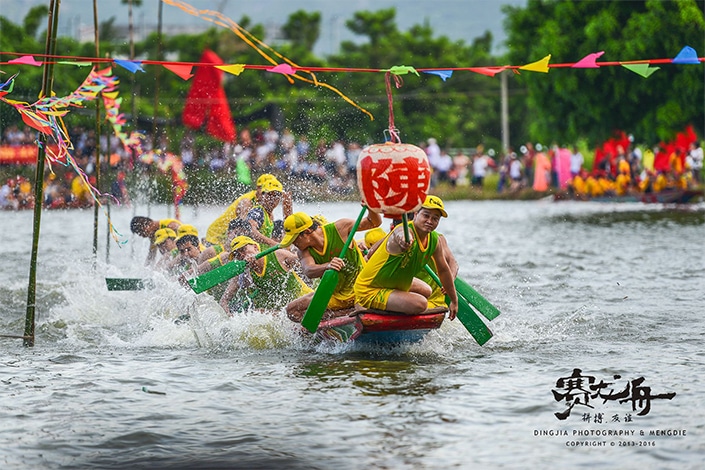
What is the history of the Dragon Boat Festival?
The Dragon Boat Festival is a traditional Chinese holiday that has been around in various forms for thousands of years. Its current iteration is an amalgamation of multiple different festivals and traditions. Two prevailing stories are often cited to explain the origin of this age-old holiday.
Read on to discover the origins of the Dragon Boat Festival and learn more about the customs associated with this traditional celebration.
The suicide of Qu Yuan
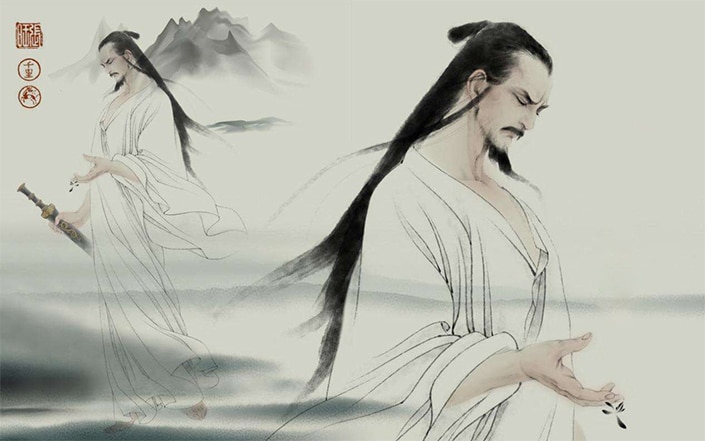
The suicide of Qu Yuan is a popular story used to explain the origins of the Dragon Boat Festival.
In modern times, the most popular story explaining the origins of the Dragon Boat Festival concerns the death of Qu Yuan (屈原, Qū Yuán), a poet of the Warring States period (approx. 475 to 221 BC).
At the time, it was common for Chinese literati to work in government, and Qu Yuan was no different. He served faithfully as a government official in the State of Chu for some time. After being slandered by another official, however, he was sent into exile.
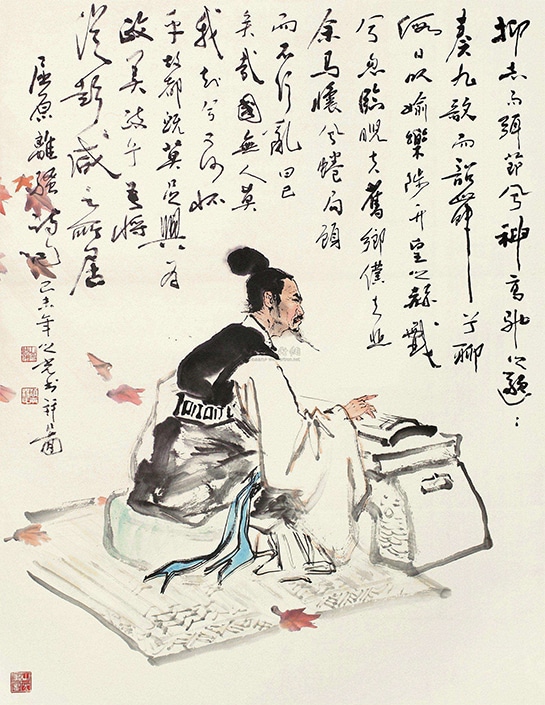
Qu Yuan was a faithful government official who was unjustly slandered.
Qu Yuan spent his exile in a productive manner, writing many works of poetry, but his mind was troubled. The State of Chu was not doing well politically, and news of its various defeats at the hands of competing states sent Qu Yuan into a deep depression.
Eventually, his despair in the face of the political situation drove him to commit suicide by drowning himself in Hunan Province’s Miluo River.
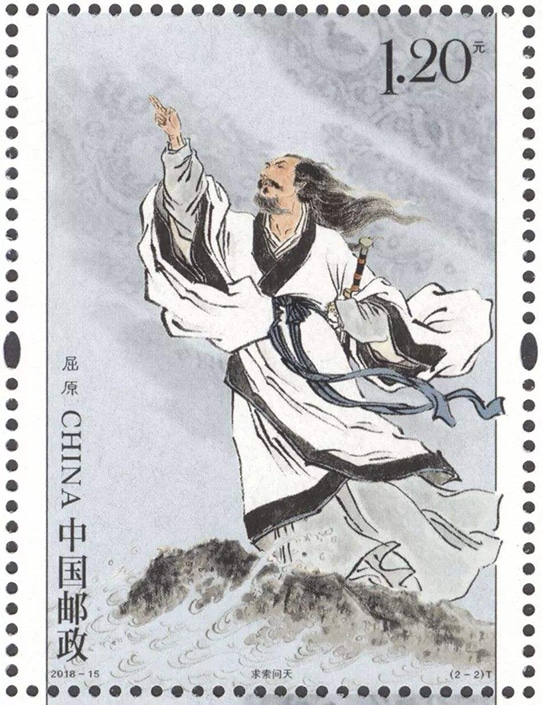
Qu Yuan remains a popular figure in modern China.
During his time in exile, Qu Yuan had become quite popular with the local people. Legend has it that when they realized he was attempting to drown himself, the citizenry rushed in boats to the middle of the river in an attempt to save him or at least retrieve his body.
Unable to find him and worried that fish would eat his body, they threw balls of sticky rice into the river in hopes that the fish would choose the rice over Qu Yuan.
Avoiding bad luck in the fifth month
Another possible explanation for the origins of the festival is linked to superstitions surrounding the date on which it falls. As noted above, the Dragon Boat Festival is also called the Double Fifth Festival because it falls on the 5th day of the 5th lunar month.
Traditionally, the fifth lunar month was considered to be an unlucky time. People in certain regions of China believed that during this month, the dreaded five poisonous animals (五毒, wǔdú), started to come out of their winter hiding places.

In ancient China, the fifth lunar month was associated with the emergence of five types of poisonous animals.
Traditionally, the animals referred to as wǔdú included centipedes, poisonous snakes, scorpions, lizards and toads. To safeguard themselves during this time, ancient people practiced rituals such as poking pictures of the five poisonous animals with pins, which was believed to render their real-life counterparts harmless.
In addition to the threat posed by the reemergence of poisonous animals, it was also believed that people were more prone to falling ill around this time.
Over the years, various traditions emerged to help ensure that people were protected from illness and bad luck during the dreaded Double Fifth. One such tradition that has survived to this day and is still incorporated into modern Dragon Boat Festival celebrations is the custom of hanging mugwort and calamus branches on one’s door to ward off evil spirits.
How do people celebrate the Dragon Boat Festival?
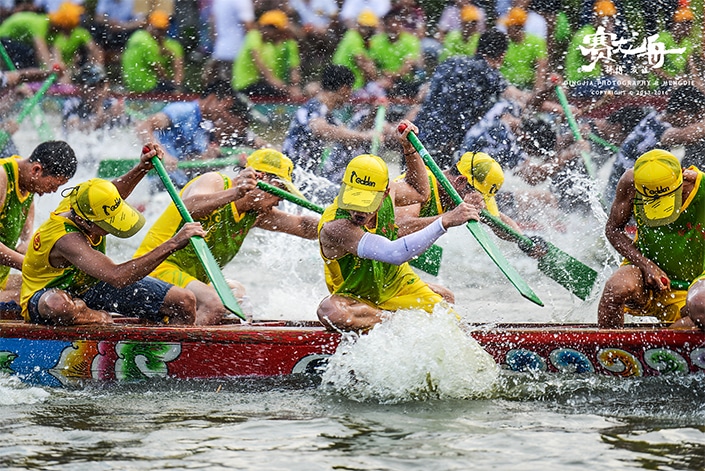
Dragon boat racing is a popular Dragon Boat Festival activity.
The dragon boat festival is a fun, boisterous holiday. In most parts of China, the weather is quite good at this time of year, and people congregate outside on the banks of rivers and lakes to enjoy the fine weather while watching traditional dragon boat races.
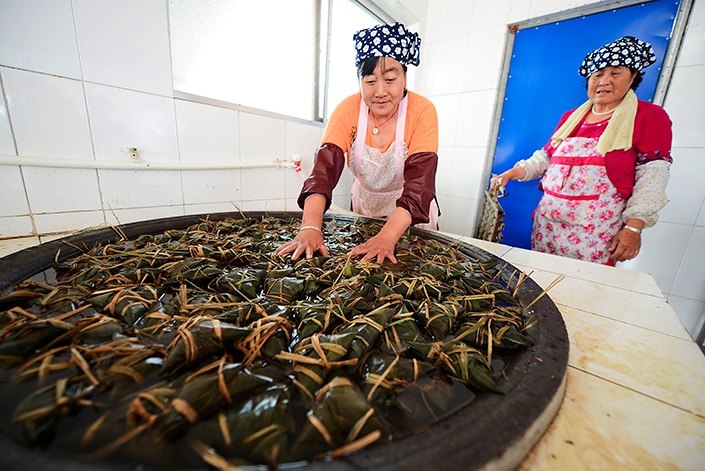
Eating bamboo-wrapped rice dumplings is popular during the Dragon Boat Festival.
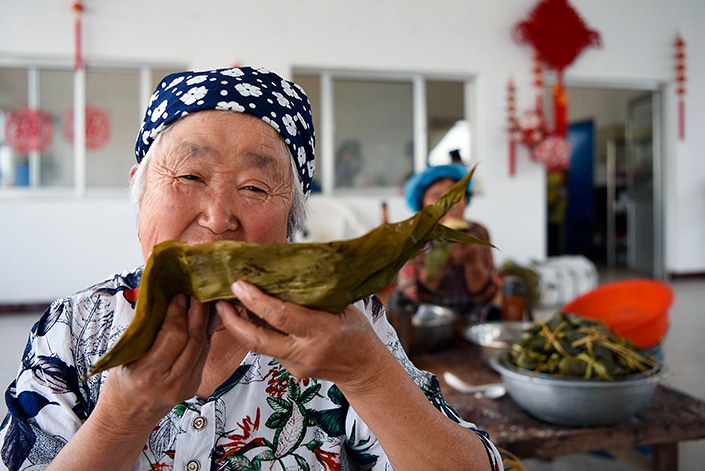
Many older Chinese people still make traditional holiday foods by hand.
Participating in or attending dragon boat races
These days, the most well-known aspect of the Dragon Boat Festival is the tradition of racing dragon boats (赛龙舟, sàilóngzhōu).
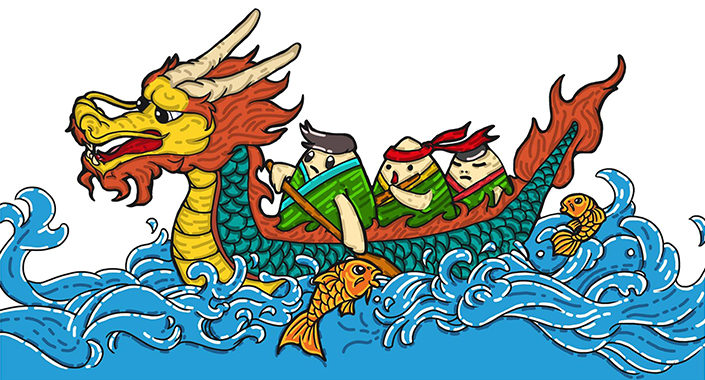
It's possible that the practice of dragon boat racing started out as a way to worship an ancient dragon god.
The story of Qu Yuan’s suicide is often used to explain the dragon boat racing tradition. In line with this explanation, racing dragon boats mimics the actions of the villagers who rowed out into the river to try to save their beloved poet.
Qu Yuan’s suicide is only one of the explanations that have been advanced, however. Dragon boat racing has a history of over 2,000 years and some scholars believe the practice most likely began as a way to worship the Dragon God .
According to this explanation, the custom is thought to have originated in southern China’s Guangdong Province along the Pearl River Delta . Even before the modern era, dragon boat racing was popular among ethnic Chinese people living throughout Asia.
Originally, dragon boats were made of teak . Today, however, most dragon boats are made of modern materials such as fiberglass. During races, the boats are fitted out with a colorful dragon head and tail.
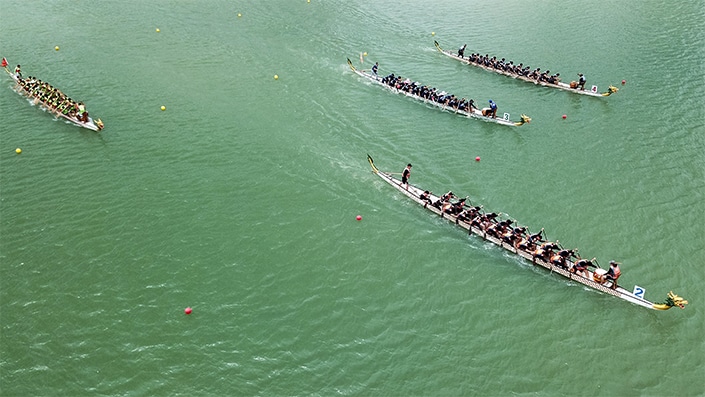
While ancient dragon boats were made of teak, most modern boats are made of fiberglass.
Over the years, dragon boat racing has developed into a sport with a variety of rules and regulations. Divorced from most of its cultural associations with the traditional folk holiday, this sport has recently gained popularity with people around the world, including in the United States. Races have even been held in big cities such as New York and Chicago.
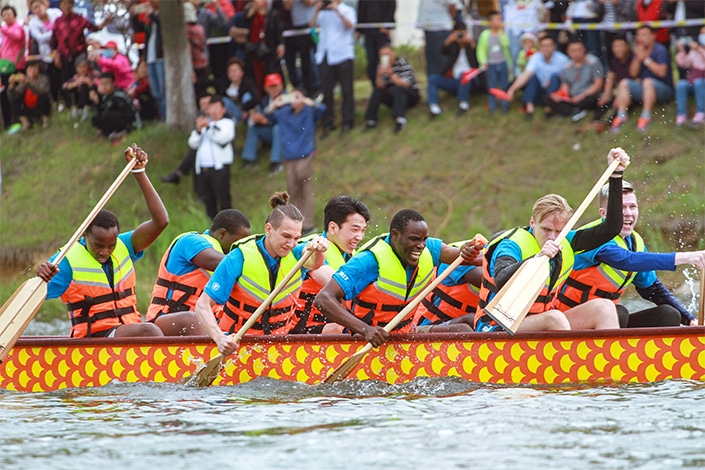
Dragon boat racing is increasingly popular in cities around the world.
Dragon boats are long and thin. Although the size of the boats and their crews can vary, in most cases, the crew consists of 20 paddlers who sit side-by-side in pairs facing the bow. There is also a drummer who sits at the bow of the boat facing the paddlers.
During a race, the drummer leads the paddlers by beating rhythmically on a drum. In addition to the drummer, there is also a steerer who sits in the back of the boat and helps to steer it using a long steering oar.
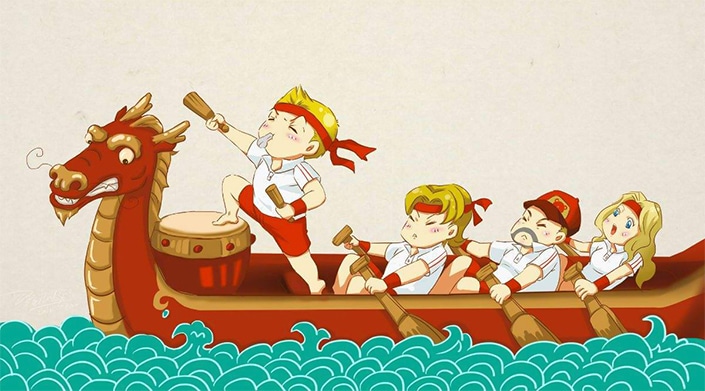
Most dragon boat racing teams include a drummer who helps the rowers stay in sync.
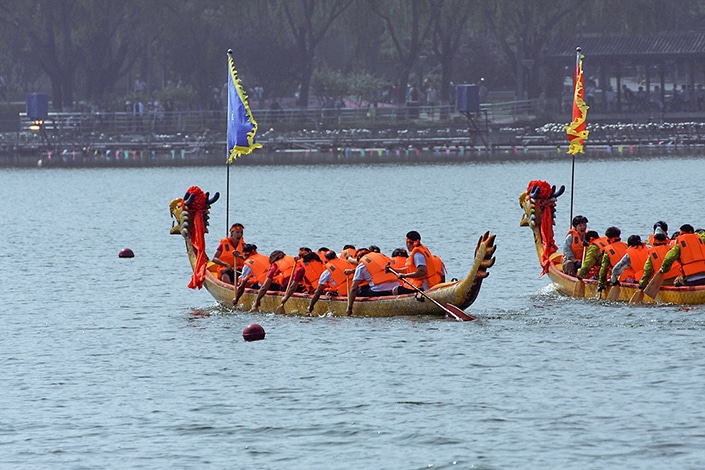
Live dragon boat races can be seen on most major bodies of water in China during the festival.
The distance covered by racers can vary from 100 to 2,000 meters (328 to 6,562 feet). The most common length for a race, however, is 500 meters (1,640 feet).
Official races organized by organizations like the International Dragon Boat Federation are held in many parts of the world. In mainland China, there are also various informal races organized by local villages and communities. Many of these informal races are held in communities where people have a close relationship with nearby bodies of water and most families own their own boats. In these settings, instead of watching from the bank, villagers sometimes row their family boats out into the river so that they can get a closer look at the dragon boats during the race.
People living in small communities where local races are held usually know most or all of the members of the dragon boat teams. Often, they are related to many of the crew members by birth or marriage. Because of the close relationships between audience members and participants, the atmosphere during these local races can be particularly exuberant.
Eating zòngzi
Almost every Chinese holiday has a specific food or foods associated with it, and Dragon Boat Festival is no different. On this holiday, the food of choice is zòngzi (粽子).
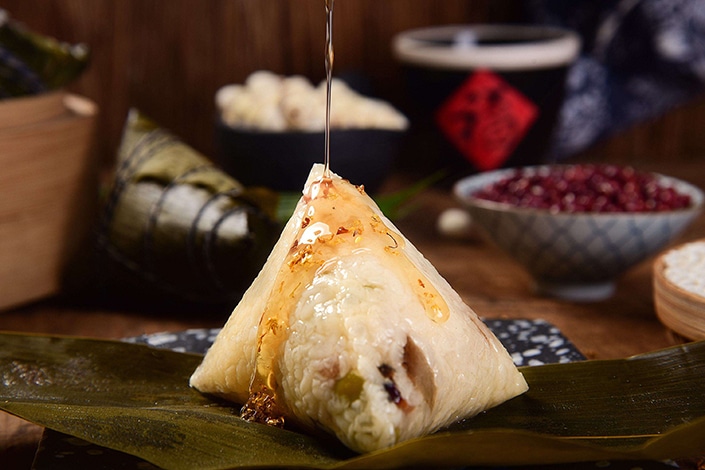
Zongzi come in both sweet and savory varieties.
Zòngzi are a type of pyramid-shaped dumpling made of glutinous rice and stuffed with various sweet or savory fillings. Common fillings for sweet zòngzi include sweet red bean paste or jujube (Chinese dates).
Savory zòngzi might be stuffed with salted egg yolks, pork or mushrooms. The dumplings themselves are wrapped in bamboo leaves, tied with a string, and either steamed or boiled.
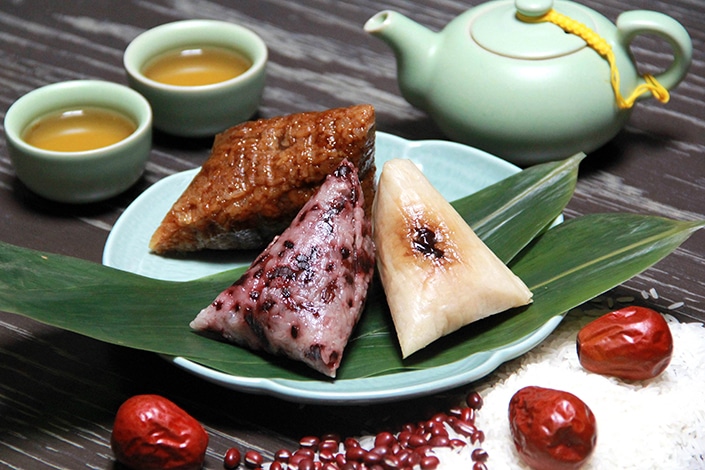
Eating zongzi is said to be a way to commemorate the poet Qu Yuan.
As discussed above, legend has it that people eat zòngzi on the Dragon Boat Festival as a way to remember the poet Qu Yuan. This is because zòngzi are thought to resemble the rice dumplings thrown into the water by villagers to stop the fish from eating his body after his suicide.
If you want to try zòngzi at most times of the year, you will likely be hard-pressed to find any. However, in the weeks leading up to the Dragon Boat Festival, zòngzi suddenly become available everywhere. Many Chinese families make their own, and pre-made versions also suddenly become available at most corner convenience stores.
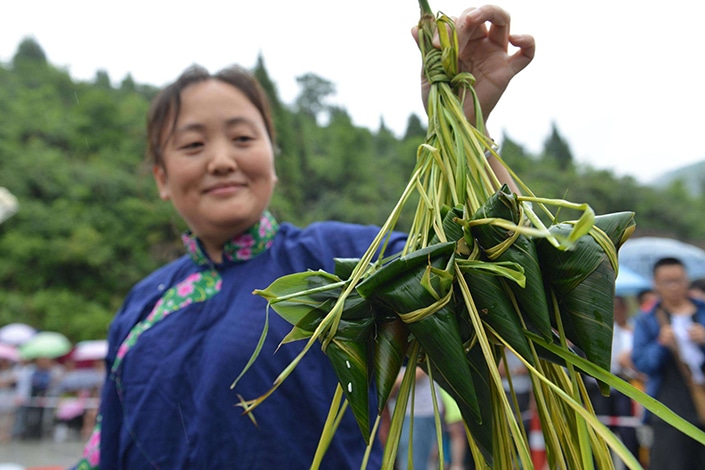
Most zongzi are still made in using a traditional bamboo wrapper.
The Dragon Boat Festival, then and now
Although the Dragon Boat Festival has a long history, it has not always found favor with the Chinese authorities. During the 1960’s, when China was embroiled in the Cultural Revolution , campaigns against traditional culture and customs caused the popularity of traditional festivals, including the Dragon Boat Festival, to decrease dramatically.
In recent years, however, Dragon Boat Festival has regained its traditional place as an important holiday in Mainland China. Thanks to attempts by the Chinese government to promote traditional Chinese culture, the Dragon Boat Festival reemerged as an official public holiday in 2008.
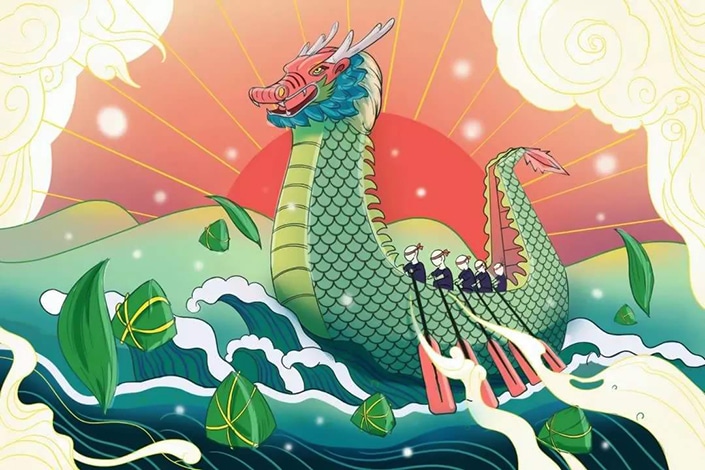
Celebrating the Dragon Boat Festival is a great way to explore traditional Chinese culture.
Despite the various ups and downs it has faced over the years, anyone who has the chance to experience the fun and infectious excitement of the Dragon Boat Festival in China will quickly understand why its popularity has endured for many millennia.
Dragon Boat Festival is just one of many fascinating Chinese holidays with roots stretching back into the distant past. If you'd like to learn more about China's many ancient holidays and traditions, you can also explore other traditional holidays like the Qingming Festival and the winter solstice festival . Learning about these traditional festivals is a fun and interesting way to enrich your understanding of Chinese culture.
| Hànzì | Pīnyīn | Definition |
|---|---|---|
| 端午节 | Duānwǔjié | Dragon Boat Festival |
| 农历 | nónglì | traditional Chinese lunar calendar |
| 阳历 | yánglì | Gregorian calendar |
| 屈原 | Qū Yuán | Chinese poet and government official during Warring States period |
| 五毒 | wǔdú | five poisonous creatures |
| 迷信 | míxìn | superstition |
| 龙舟 | lóngzhōu | dragon boat |
| 赛龙舟 | sàilóngzhōu | hold a dragon boat race |
| 粽子 | zòngzi | bamboo-wrapped glutinous rice dumplings |
| 节日 | jiérì | holiday |
| 传统 | chuántǒng | tradition |
| 风俗 | fēngsú | custom (cultural) |
The administrator of this group reserves the right, along with the site moderators, to moderate all and any postings to this group, including the right to enforce the ToS, the CoC, and also including anything that the administrator deems within his sole discretion to be offensive, including and not limited to off topic comments, with the power to delete in exercising those rights.
It would be best, therefore, to be civil in posting on this group.
By now it should be well known that I am unable to open certain sources, videos and pictures. If I cannot, I will ask that they be described and explained. If the poster refuses to comply, their comment will be deleted. Instagrams are banned.


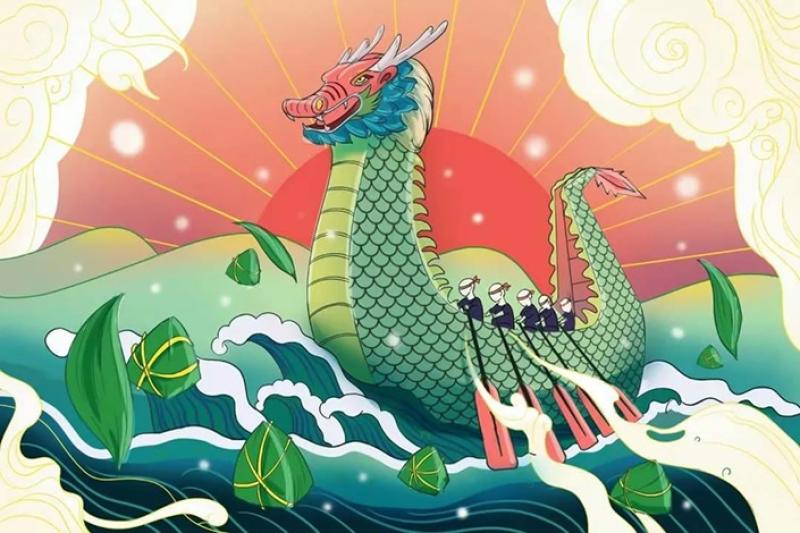



Today is Dragon Boat Festival, one of the main 4 festivals in China. Although I'll be watching dragon boat races on TV rather than attending them, I did eat delicious zongzi for breakfast. I know that besides in China, dragon boat races are held in many other countries in the world.
The article mentioned another custom, one which we carried out here in our own home, as we have done every year. We hang the branches indoors on the doors in every room, and the fragrance is very nice.
Hanging Chinese Mugwort and Calamus
The Dragon Boat Festival is held at the start of summer when diseases are more prevalent. Mugwort leaves are used medicinally in China to combat such diseases. Their fragrance deters flies and mosquitoes. Calamus is an aquatic plant that has similar effects.
On the fifth day of the fifth month, people usually clean their houses, courtyards, and hang mugwort and calamus on doors lintels to discourage diseases. It is also said hanging mugwort and calamus can bring good luck to the family.